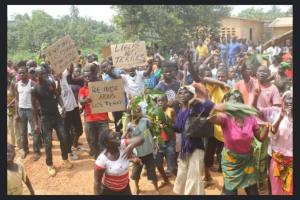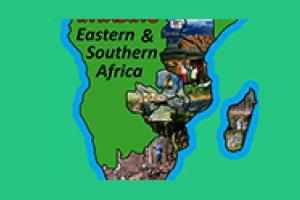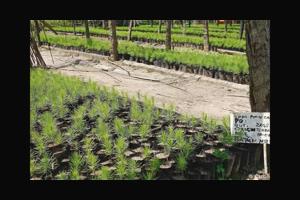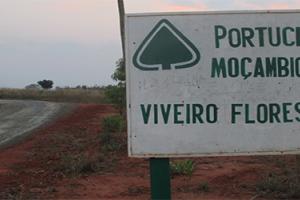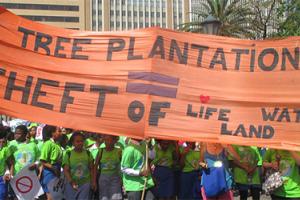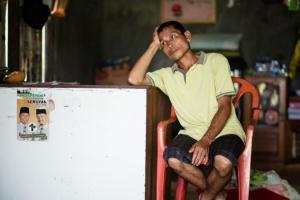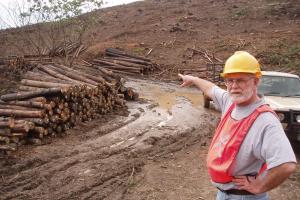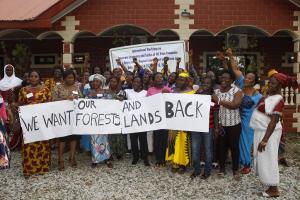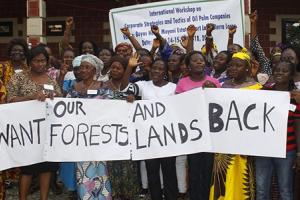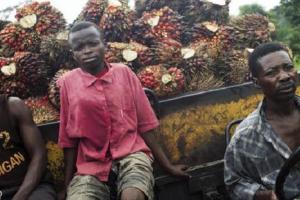Three villages in Côte d’Ivoire were informed in 2015 that the government had granted a concession covering a total of 11 thousand hectares to Compagnie hévéicole de Prikro (CHP), the Ivorian subsidiary of the Belgian corporation Société d’investissement pour l’agriculture tropicale (SIAT), for establishing an industrial rubber tree plantation. A recent report from the NGO GRAIN recounts the communities’ on-going struggle for recuperating their land.
Large-Scale Tree Plantations
Industrial tree plantations are large-scale, intensively managed, even-aged monocultures, involving vast areas of fertile land under the control of plantation companies. Management of plantations involves the use of huge amounts of water as well as agrochemicals—which harm humans, and plants and animals in the plantations and surrounding areas.
Other information
9 January 2018
Other information
9 January 2018
This briefing, compiled by the World Rainforest Movement (WRM) and the Timberwatch Coalition (TW), is now also available in Swahili. It focuses on various internal and external factors determining changes in the extent of land under industrial tree plantations in 11 eastern and southern African countries: Malawi, Mozambique, Zambia and Zimbabwe; Kenya, Tanzania and Uganda; South Africa, Swaziland and Lesotho; and Madagascar.
Bulletin articles
9 January 2018
The devastating impacts of Green Resources’ tree plantation and carbon offset project in Uganda exposes the limits of carbon markets. While villagers carry the social, environmental and other costs of this project by loosing access and control over their land, the company is allowed to profit even more from its destructive plantations, framing them as “carbon sinks”.
Bulletin articles
9 January 2018
Industrial tree plantation projects in Mozambique are gaining more and more ground in processes of land acquisition and dispute. The Portuguese company, Portucel, has a “reforestation” plan through 2026 that aims to cover 356 thousand hectares.
Bulletin articles
9 January 2018
This article gives an overview on the industrial tree plantation expansion threat in eastern and southern African countries, its external drivers, as well as the challenges this expansion presents to affected communities struggling to defend their land and livelihoods.
Other information
23 November 2017
The commercial power of the oil palm industry in Indonesia is intertwined with politicians and government authorities at the highest level, which leads to violent grabbing of land from peasant and traditional communities. This article, part of the series “Indonesia for sale”, is the story of money, politics and power in Seruyan, Borneo, Indonesia, one of the main focal areas of the oil palm industry in the country.
Access the article in English here.
Action alerts
6 November 2017
Available only in English and Spanish
Other information
30 October 2017
As WRM team, we are shocked and sad with the news that Wally Menne passed away, given the force and energy with which Wally always contaminated us, given his friendship, attention with us and other friend-activists.
25 October 2017
On occasion of September 21st, International day of Struggle against Tree Plantations, women from several countries from West and Central Africa have taken the initiative to release simultaneously the petition we enclose below.
The petition is an urgent request from women in Africa to stop the suffering and the violent impacts the expansion of industrial oil palm plantations is creating on womens´ lives, that affect women in and outside the African continent: Violence, sexual abuses, rape, harassment, persecution, destruction of their means of livelihoods.
Multimedia
28 September 2017
By Global Justice Ecology and Project and Stop GE Trees
Bulletin articles
25 September 2017
Large-scale monoculture plantations “rob women of everything they have as they take the agricultural lands and forests that women depend upon for their livelihoods and for feeding their families”. This is part of the final declaration of a workshop organized in Port Loko, Sierra Leona, in August 2017, which brought together women from Sierra Leona’s Northern, Southern and Eastern regions, together with representatives from Cameroon, Liberia and Guinee. (1)
Bulletin articles
21 September 2017
Oil palm plantations managed by the Canadian-based agribusiness company FERONIA Inc have been opposed by local residents ever since they were established by the previous owner of the plantations, multinational food company Unilever. Incidents of violent abuse and conflict arising from the company’s oil palm plantations in the Democratic Republic of the Congo (DRC) have been a regular occurrence. In 2015, seven children were left orphaned after police killed both indigenous pygmy parents for taking some oil palm fruits from the plantations to feed their children.
